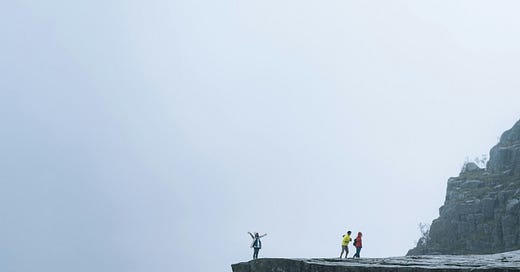Photo by Valdemaras D. on Unsplash
Parents often describe the time after a student finishes with high school school as “falling off the cliff.” What do they mean by that?
Every child in this country has a guaranteed right to an education, regardless of their disabilities. In my early twenties, I worked as a special education teacher in the South Bronx at a school for multiply disabled children. There was one room that was just for children in semi-vegetative states. They were wheeled into the school in chairs and special beds. The teacher and the aides made sure that the kids were fed and clean, but they couldn’t do much except for play music and talk softly in their ears.
Public schools must educate all kids from eight to three every day with rights guaranteed by the Individuals with Disability Act. Yes, some schools take that mission more seriously than others, but, even in the worst situations, schools must watch your kid all day or send them to alternative school. Parents have the right to get lawyers involved and demand that they make changes. Parents know that their kids are safe and watched by a certified public school teacher, who holds at least a BA.
With that sort of security, it’s possible to go on parenting autopilot for years. Kid gets on the bus in the morning. Kid gets back in the afternoon. Kid goes to therapy or an activity. Make dinner. Watch TV. Go to Bed. Repeat.
However, the education entitlement with seven hours of supervision ends when the student graduates from high school. After that, families are on their own. If plans haven’t been set up, parents say they step into a void. There’s no equivalent of a school to manage their kid’s life all day. There is no right to demand quality service. There is no teacher supervising their child.
If plans haven’t been set in place, parents say that they “step into the void” — a nowhere zone where parents and young people have been dumped without a road map. With a young person suddenly at home all day, one parent might have to quit their job to supervise their time. The disabled person would lose skills, and become isolated and frustrated. Cliffs and voids are bad things for young adults and families.
It doesn’t have to be that way. Parents can take a great leap over that void, rather than falling below, if they start by making plans beginning when their child turns as early as age 15. It does take some education and planning, but it can be done.
At age 15, the parents, with support from professionals, should do an assessment of the young person’s functional levels and take some guesstimates about their future options — Will they go to college? Can they work? Parents should imagine a best case scenario and a worst case scenario, and then plan for both at the same time.
The worst case scenario may be unemployment and government support. If your child has been diagnosed with autism or a significant disability, then they might qualify for government benefits, which can be used to pay for a day program, therapists to come to your house, college tuition, recreational activities, and more. The government will pay you to manage the system. That support can range from $30,000 per year to $400,000 or more.
The best case scenario is a job, education, employment, independent living, family, recreation, and more. Hopefully, all of our kids get there, but they might just take longer to achieve those goals than other young people. So, that’s why it’s a good thing to have that government support on the road to the good life.
Getting to that happy place of independence and adulthood, might mean on-going parental oversight. Parents, you probably aren’t going to be empty nesters right away, so it’s best to just accept that. But don’t feel too bad, because tons of typical kids still live with their parents in their twenties, too.
And your young person is going to have to keep learning and honing their skills. That’s okay! They can do it!
You don’t have to fall off the cliff at all. Taking a great leap does take some planning and education. I’m here to help.
Updates
A Great Leap is now a weekly newsletter, published every Friday, with excepts of a book that I’m writing. Half of the content remains free.
Paid subscribers get additional information below the fold and the warm feeling of supporting a writer and advocate.
Today’s information is about the importance of self-identification.
Keep reading with a 7-day free trial
Subscribe to A Great Leap to keep reading this post and get 7 days of free access to the full post archives.




